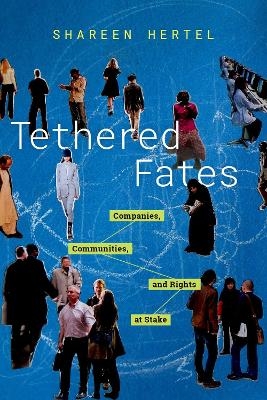
Tethered Fates
Companies, Communities, and Rights at Stake
Seiten
2019
Oxford University Press Inc (Verlag)
978-0-19-090383-1 (ISBN)
Oxford University Press Inc (Verlag)
978-0-19-090383-1 (ISBN)
Tethered Fates explores the challenge of safeguarding economic rights beyond the factory floor in global supply chains. Drawing on a 7,000-company database, it maps trends in company-community interaction through "stakeholder dialogue." It features grassroots perspectives from two manufacturing communities in the Dominican Republic, and assesses emerging policy alternatives globally.
Since the 1990s, human rights advocates, business leaders, and consumers have become increasingly attuned to mitigating sweatshop labor and other abuses in the supply chains that manufacture the clothing, electronics, and countless other products that we buy and use each day. But we know surprisingly little about how companies interact with people in the communities beyond the factory's walls. In many cases, community members are left out of the process of identifying both risks and solutions to problems in global supply chains, including how global companies could add social value in the localities where they operate. Business, governments, and civil society are supposed to be jointly responsible for shaping the remedies available to people harmed in the course of business activity, wherever it takes place. However, the answer to the question of how to do this remains underdeveloped and poorly executed. This book explores the conditions under which local communities and companies can work with one another and the types of remedies available in one of the most widespread and challenging sectors: light manufacturing.
Tethered Fates draws on quantitative data (including the 7,000-company database of the Business and Human Rights Resource Centre) and original qualitative data to analyze regional and industry-specific trends in stakeholder dialogue globally and at the local level. The book features original interviews with community members in two factory towns in the Dominican Republic, whose perspectives shed light on the prospects for dialogue with companies and the challenges of everyday life in towns where light manufacturing takes place. Tethered Fates does more than simply explain why stakeholder dialogue often falls short as a vehicle for safeguarding economic rights and promoting community development. It also offers an assessment of the varieties of emerging policy alternatives for moving beyond the current state of practice.
Since the 1990s, human rights advocates, business leaders, and consumers have become increasingly attuned to mitigating sweatshop labor and other abuses in the supply chains that manufacture the clothing, electronics, and countless other products that we buy and use each day. But we know surprisingly little about how companies interact with people in the communities beyond the factory's walls. In many cases, community members are left out of the process of identifying both risks and solutions to problems in global supply chains, including how global companies could add social value in the localities where they operate. Business, governments, and civil society are supposed to be jointly responsible for shaping the remedies available to people harmed in the course of business activity, wherever it takes place. However, the answer to the question of how to do this remains underdeveloped and poorly executed. This book explores the conditions under which local communities and companies can work with one another and the types of remedies available in one of the most widespread and challenging sectors: light manufacturing.
Tethered Fates draws on quantitative data (including the 7,000-company database of the Business and Human Rights Resource Centre) and original qualitative data to analyze regional and industry-specific trends in stakeholder dialogue globally and at the local level. The book features original interviews with community members in two factory towns in the Dominican Republic, whose perspectives shed light on the prospects for dialogue with companies and the challenges of everyday life in towns where light manufacturing takes place. Tethered Fates does more than simply explain why stakeholder dialogue often falls short as a vehicle for safeguarding economic rights and promoting community development. It also offers an assessment of the varieties of emerging policy alternatives for moving beyond the current state of practice.
Shareen Hertel is an Associate Professor of Political Science and Human Rights at the University of Connecticut and has worked with foundations, nongovernmental organizations (NGOs), and United Nations agencies in the United States, Latin America, and South Asia for over two decades. Hertel is also editor of The Journal of Human Rights and and has published books and articles across multiple disciplines.
| Erscheinungsdatum | 09.04.2019 |
|---|---|
| Verlagsort | New York |
| Sprache | englisch |
| Maße | 213 x 145 mm |
| Gewicht | 391 g |
| Themenwelt | Recht / Steuern ► Arbeits- / Sozialrecht ► Arbeitsrecht |
| Recht / Steuern ► EU / Internationales Recht | |
| Sozialwissenschaften ► Politik / Verwaltung ► Politische Theorie | |
| ISBN-10 | 0-19-090383-X / 019090383X |
| ISBN-13 | 978-0-19-090383-1 / 9780190903831 |
| Zustand | Neuware |
| Haben Sie eine Frage zum Produkt? |
Mehr entdecken
aus dem Bereich
aus dem Bereich
mit den wichtigsten Bestimmungen zum Arbeitsverhältnis, …
Buch | Softcover (2024)
dtv Verlagsgesellschaft
13,90 €
Tarifrecht öffentlicher Dienst : Textausgabe
Buch | Softcover (2024)
dtv Verlagsgesellschaft
23,90 €


